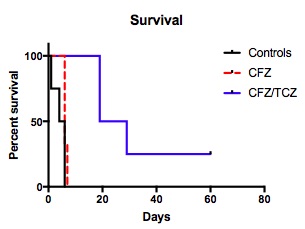Dual Targeting with Carfilzomib and Tocilizumab Abrogates Antibody-Mediated Rejection and Prolongs Survival in a Highly Sensitized Rhesus Model of Kidney Transplantation.
Duke University Medical Center, Durham, NC
Cedars-Sinai Medical Center, Los Angeles, CA
Meeting: 2017 American Transplant Congress
Abstract number: 14
Keywords: Alloantibodies, Kidney transplantation, Sensitization
Session Information
Session Name: Concurrent Session: B Cells in Alloimmunity
Session Type: Concurrent Session
Date: Sunday, April 30, 2017
Session Time: 2:30pm-4:00pm
 Presentation Time: 2:54pm-3:06pm
Presentation Time: 2:54pm-3:06pm
Location: E350
Purpose:
Sensitized recipients have poor access to kidney transplantation (KT) and worse outcomes when transplanted. We have shown that bortezomib inhibits plasma cells (PCs), but does not impact donor-specific antibody (DSA) due to upstream germinal center (GC) compensation. We hypothesized that PC depletion with carfilzomib (CFZ), a proteasome inhibitor, and GC suppression with tocilizumab (TCZ), an anti-IL-6R monoclonal antibody (mAb), would produce durable desensitization.
Methods:
Skin-sensitized rhesus pairs were treated with CFZ (8mg/kg IV) and TCZ (20mg/m2 IV) weekly for a month. Peripheral blood, lymph node, and bone marrow cells were analyzed pre- and post-treatment. Swapping KT was performed, and graft survival monitored. At necropsy, allografts were evaluated blindly by a pathologist.
Results:
CFZ/TCZ (n=6) reduced DSA by 12-41% (p=0.003), while CFZ alone (n=3) reduced levels by 28-53% (p=0.031). CFZ/TCZ reduced peripheral PCs (mean 37.3% to 15.9% CD3[mdash]CD20[mdash]CD27+IgGlo cells, p=0.038), while CFZ alone caused a non-significant reduction (mean 33.2% to 15.7%, p=0.062). CFZ/TCZ reduced lymph node TFH cells (mean 3.2% to 1.8% CD3+CD4+PD1highICOS+cells, p=0.024), while CFZ alone had a non-significant trend (mean 2.8% to 4.2%, p=0.423). CFZ/TCZ reduced peripheral TREG cells (6.4% to 4.1% CD3+CD4+CD25+CD127[mdash] cells, p=0.016), while CFZ alone had a non-significant trend (5.7% to 7.3%, p=0.906). CFZ/TCZ produced a mean survival of 32 days vs. 6 days with CFZ alone. No transplanted CFZ/TCZ treated animals had antibody-mediated rejection (AMR). CFZ/TCZ with CD4/CD8 mAb induction reactivated rCMV. Conclusion:
Conclusion:
CFZ/TCZ abrogated AMR and prolonged graft survival in a highly sensitized rhesus model of KT. A possible mechanism for prolonged survival includes greater inhibition of PCs through control of upstream TFH cells. A reduction in TREG cells was seen, which may lead to eventual cellular rejection. Viral immunity was impaired by this regimen.
CITATION INFORMATION: Ezekian B, Kwun J, Manook M, Freischlag K, Curfman V, Branum E, Park J, Yi J, Jordan S, Knechtle S. Dual Targeting with Carfilzomib and Tocilizumab Abrogates Antibody-Mediated Rejection and Prolongs Survival in a Highly Sensitized Rhesus Model of Kidney Transplantation. Am J Transplant. 2017;17 (suppl 3).
To cite this abstract in AMA style:
Ezekian B, Kwun J, Manook M, Freischlag K, Curfman V, Branum E, Park J, Yi J, Jordan S, Knechtle S. Dual Targeting with Carfilzomib and Tocilizumab Abrogates Antibody-Mediated Rejection and Prolongs Survival in a Highly Sensitized Rhesus Model of Kidney Transplantation. [abstract]. Am J Transplant. 2017; 17 (suppl 3). https://atcmeetingabstracts.com/abstract/dual-targeting-with-carfilzomib-and-tocilizumab-abrogates-antibody-mediated-rejection-and-prolongs-survival-in-a-highly-sensitized-rhesus-model-of-kidney-transplantation/. Accessed March 4, 2026.« Back to 2017 American Transplant Congress
